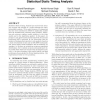Free Online Productivity Tools
i2Speak
i2Symbol
i2OCR
iTex2Img
iWeb2Print
iWeb2Shot
i2Type
iPdf2Split
iPdf2Merge
i2Bopomofo
i2Arabic
i2Style
i2Image
i2PDF
iLatex2Rtf
Sci2ools
112
click to vote
ICCAD
2006
IEEE
2006
IEEE
An accurate sparse matrix based framework for statistical static timing analysis
Statistical Static Timing Analysis has received wide attention recently and emerged as a viable technique for manufacturability analysis. To be useful, however, it is important that the error introduced in SSTA be significantly smaller than the manufacturing variations being modeled. Achieving such accuracy requires careful attention to the delay models and to the algorithms applied. In this paper, we propose a new sparse-matrix based framework for accurate path-based SSTA, motivated by the observation that the number of timing paths in practice is sub-quadratic based on a study of industrial circuits and the ISCAS89 benchmarks. Our sparse-matrix based formulation has the following advantages: (a) It places no restrictions on process parameter distributions; (b) It embeds accurate polynomial-based delay model which takes into account slope propagation naturally; (c) It takes advantage of the matrix sparsity and high performance linear algebra for efficient implementation. Our experim...
Accurate Polynomial-based Delay | Hardware | ICCAD 2006 | Process Parameter Distributions | Static Timing Analysis |
Related Content
| Added | 16 Mar 2010 |
| Updated | 16 Mar 2010 |
| Type | Conference |
| Year | 2006 |
| Where | ICCAD |
| Authors | Anand Ramalingam, Gi-Joon Nam, Ashish Kumar Singh, Michael Orshansky, Sani R. Nassif, David Z. Pan |
Comments (0)

